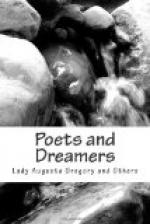’What was the dead cat
that put me in this place,
And all the pretty young girls
I left after me?
I came into the house where
was the bright love of my heart,
And the old hag put me out
by the Twisting of the Rope.
’If you are mine, be
mine by day and by night;
If you are mine, be mine before
the world;
If you are mine, be mine with
every inch of your heart;
It is my grief you are not
with me as a wife this evening.
’It is down in Sligo
I got knowledge of my love;
It is up in Galway I drank
my fill with her.
By the strength of my hands,
if they do not leave me as I am,
I will do a trick will set
these women walking.’
Mr. Yeats made Red Hanrahan the hero of this song in a story in ’The Secret Rose’; and it is Hanrahan Douglas Hyde has kept in the play, with his passion, his exaggerations, his wheedling tongue, his roving heart, that all but coax the girl from her mother and her sweetheart; but that fail after all in their attack on the settled order of things, and leave their owner homeless and restless, and angry and chiding, like the stormy west wind outside the door.
‘The Marriage’ is founded on the story of Raftery at the poor wedding at Cappaghtagle. It was acted in Galway, at the Feis, last summer. There had been some delay or misunderstanding in the giving of parts; and on the morning of the Feis, it was announced that the play would not be given. But the disappointment was so great, that we all begged An Craoibhin to take the chief part himself, as he had done in ’The Twisting of the Rope’; and when his kindness made him agree to this, we went in search of the other players. They were all at work in shops or stores, one wheeling sacks on a barrow; and it was a busy market-day, and it was hard for them to get away for a rehearsal. But, for all that, the play was given in the evening; in the very town where some still remember Raftery, and where he and Death had their first talk together.
It will be hard to forget the blind poet, as he was represented on the stage by the living poet, so full of kindly humour, of humorous malice, of dignity under his poor clothing, or the wistful, ghostly sigh with which he went out of the door at the end. ’Is fear marbh do bhi ann’—’It is a dead man was in it.’
It has been acted in Dublin since then; and many places are asking for the loan of the one manuscript in which it exists; but I am glad Connacht had it first.
‘The Lost Saint’ was written last summer. An Craoibhin was staying with us at Coole; and one morning I went for a long drive to the sea, leaving him with a bundle of blank paper before him. When I came back at evening, I was told that Dr. Hyde had finished his play, and was out shooting wild duck. The hymn, however, was not quite ready, and was put into rhyme next day, while he was again watching for wild duck beside Inchy marsh.




